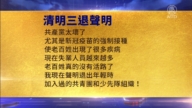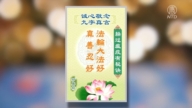【新唐人2013年09月13日讯】美国电脑巨头微软9月3号宣布,将以72亿美元价格收购诺基亚。在大家热议这个收购本身的同时,也注意到了一个事实:诺基亚竟然有140多年的历史。反观中国,企业都在喊“打造百年老店”,那么中国有真正的百年老店吗?外国企业为什么能这么长寿?中国企业又为什么如此短命?我们来看看专家和企业老板的分析。
据统计,在中国,现存的超过150年历史的“老店”仅有5家。中国最古老的企业是成立于1538年的“六必居”,之后是1663年的剪刀老字号张小泉,再加上“陈李济”、广州同仁堂药业以及“王老吉”。而超过100年的企业还有青岛啤酒、泸州老窖等。
研究中国问题的专家表示,中共自建政以来,先后通过所谓的“土地改革”、“工商改造”,消灭了地主和资本家,把曾经属于私人的资产通过运动充公,致使许多企业纷纷倒闭,“老店”也是名存实亡,而国有企业的垄断更是雪上加霜。
独立中国问题学家巩胜利:“老字号的传承几乎没有很大的发展空间和前景。一个是把你的市场垄断,还有你没有资本的来源,没有资金,没有货币的支持,你怎么发展。这个制度决定了企业的生存的法则。”
资料显示,截至2012年,在日本,存续超过100年以上的“长寿企业”已突破2.1万家。历史超过200年的企业有3146家,为全球最多,更有7家企业历史超过了1000年。排在世界最古老企业前三位的都是日本企业。
另外,超过200年历史的长寿企业在欧洲也不少,德国有837家,222家在荷兰,还有196家在法国。就连仅有200多年历史的美国,百年家族企业也达到1100家。
旅居加拿大的理财顾问陈挺认为,那些拥有甚至是上千年历史的“长寿”企业,是因为他们的国家尊重私有产权,并在法律法制层面上有立法保障的缘故。
理财顾问陈挺:“(他们)对私有产权是一种认为是与生俱来的、是天赋的、是不可剥夺的,共产主义一个最主要的特征就是要消灭私有制,所有的生产资料全要实行公有。中国没有法律对私营产权进行保护,中国的政府拥有比法律高的权力。”
中国企业不仅不长寿,甚至有些短命。
拥有上千万资金的江苏南通红枫丽莱木业有限公司的法定代表人张俊国的太太认为,中国的企业寿命短的原因之一是,政府强拆政策直接导致大批企业被破产。
原民营企业老板娘徐丽艳:“像我这个企业是一个责任有限公司是个招商引资企业,也是在国家建材方面的30强企业,已经是十几年的企业了,因为拆迁补偿不到位,就给我94310,打个地坪都不够,这个企业现在已经破产了,企业根本就谈不到寿命。”
独立中国问题学家巩胜利认为,中共独裁之下,所谓的“党组织进入”超过千人的企业,加速了企业成本的高起,也是导致企业“短命”的一个原因。
陈挺指出,共产党害怕倒台,迫不得已才让部分的中国人拥有一些私营的企业。
陈挺:“比如说交通呀、通信啊、石油啊能源、金融啊这些都还没有开放,都没有让私人资本进入。”
据2008年大陆民营企业全国工商联编写的《中国民营企业发展报告》披露:中国每年新生15万家民营企业,同时又会死亡10万多家,有60%的民营企业在5年内破产,85%的民营企业在10年内消亡,它们的平均寿命只有2.9年,营业额超过1000万的企业平均寿命也只有7年。
(采访/朱智善 编辑/易如 后制/钟元)
Why Foreign Companies More Well-Off Than Chinese?
U.S. computer giant Microsoft announced on September 3
that it will acquire Nokia for $7.2 billion.
During the discussions on this transaction,
people noticed that Nokia actually has 140 years of history.
While companies in China have a slogan of
“Building Business with One hundred Years’ History,”
does China really have businesses with 100 years of history?
Why are foreign companies able to have long histories,
while Chinese enterprises are often short-lived?
According to statistics, China only has five enterprises
with over 150 years of history.
China’s oldest enterprise is Liubiju Food, founded in 1538,
followed by Zhangxiaoquan Scissors, founded in 1663.
Chenliji Pharmaceuticals, Tong Ren Tang Medicine
and Wanglaoji Herbal Tea are the other three businesses.
Chinese businesses with more than 100 years of history
include Qingdao Beer and Luzhou Laojiao.
China experts say that since the Chinese Communist Party (CCP)
took over China, it carried out the so-called “land and business
reforms" to wipe out landlords and capitalists.
Private businesses were confiscated, causing many to collapse.
Old businesses only kept the names.
The monopoly of state-owned enterprises is even worse.
Gong Shengli, independent researcher on China issues:
“There isn’t much space or future for old-brand businesses.
The market is monopolized, with no capital, no investment,
how can one develop?
The system determines the survival and rules of enterprises."
Statistics show as of 2012, Japan has over 21,000 businesses
with over 100 years of history, 3,146 over 200 years of history,
ranking top of the world.
Seven businesses have over 1,000 years of history.
The top three world’s oldest companies are Japanese companies.
There are lots of businesses in Europe with more than
200 years of history, 837 in Germany, 222 in the Netherlands,
196 in France.
There are 1,100 businesses with over 100 years of history
in the U.S., a country with only over 200 years of history.
Chen Ting, a financial consultant from Canada,
says businesses that survived over 1,000 years because
the country respects private property rights,
and protects them in the legal aspects.
Chen Ting: “They think private property cannot be deprived.
The major trait of Communism is to eliminate
private ownership and share all production materials.
China doesn’t have laws to protect private property.
The Chinese government has more power than the law."
Chinese enterprises do not have longevity,
and some even some short-lived.
Zhang Junguo, Legal Person of Nantong Hongfeng Wood Co.,
says one of the reasons for Chinese enterprises’ short life
is the government’s demolition policy,
that causes bankruptcy of many businesses.
Zhang Junguo: “My business is a limited liability company.
It needs investment and it is one of the nation’s top three
companies in building materials.
The company was founded a decade ago.
But we were not compensated well during demolition.
I was only given 94,300 yuan, barely to pay for a parking lot.
The company is already in bankruptcy.
There is simply no longevity for businesses."
Gong Shengli says the high cost of the CCP’s so-called
“party controlled” enterprises is another reason
for their being “short-lived."
Chen Ting says that the CCP was forced to
allow some Chinese people have private enterprises
in fear of its collapse.
Chen Ting: “Transportation, communications, oil and gas,
energy and finance sectors are not open for private investment."
The Chinese Private Enterprise Development Report,
prepared in 2008 by National Federation of Private Enterprises,
says that China has 150,000 new private enterprises each year,
while more than 100,000 have collapsed.
60% of private enterprises have gone bankrupt within five years,
while 85 % of private enterprises disappear in 10 years.
Their average life expectancy is only 2.9 years.
Live expectancy of companies with over 10 million yuan
($1.6 million) in yearly revenue is only seven years.
NTD Report Yi Ru


























